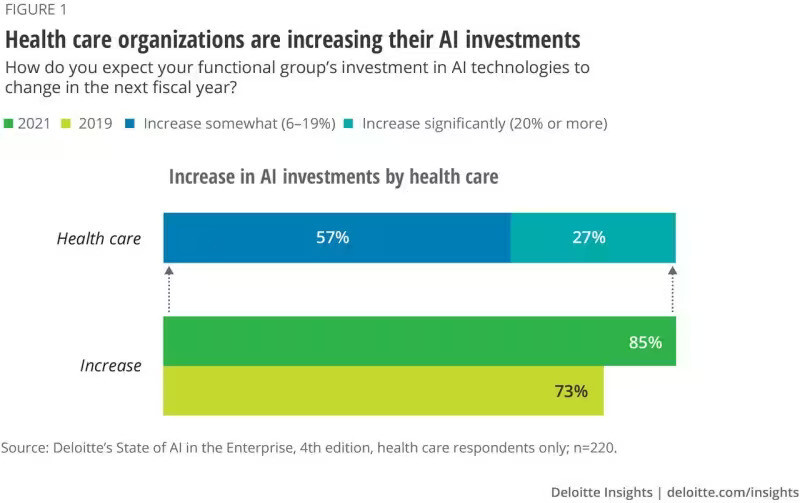Subtotal $0.00

- Artificial intelligence is reshaping the way we approach patient care and treatment decisions.
- By integrating AI as part of diagnostic services, healthcare organizations are facilitating faster diagnoses and treatment decisions that improve patient outcomes.
- New tools can help support the earlier identification of disease, streamline workflows and alleviate employee burnout.
New applications of artificial intelligence (AI) repeatedly challenge what was once thought possible. This technology is having a profound impact on nearly every industry worldwide, wielding greater efficiency and transforming whole operational processes. Healthcare is no exception – AI is reshaping the way we approach patient care and treatment decisions.
AI offers practical solutions that can help organizations across the globe to overcome these challenges and improve outcomes, enhance care and advance health equity.
Streamlining healthcare workflows
By integrating AI as part of diagnostic services, healthcare organizations are facilitating faster diagnoses and treatment decisions that improve patient outcomes.
AI’s complex algorithms provide support to radiologists, who read hundreds of medical images a day, helping them analyse images such as X-rays and MRIs quicker and more accurately. This allows care teams to prioritize complex and urgent cases, and potentially detect modalities that may require further inspection.
 Healthcare organizations are beginning to recognize more opportunities to use AI Image: Deloitte Insights
Healthcare organizations are beginning to recognize more opportunities to use AI Image: Deloitte Insights
Alleviating employee burnout and supporting staffing needs
Necessary but time-consuming administrative tasks contribute to employee burnout and take clinicians away from the bedside. New AI tools can help alleviate burnout and allow staff to focus on patients by automating manual and repetitive tasks such as entering data for electronic health records and submitting prior authorization requests to insurance companies.
In addition to supporting employees in their day-to-day work, AI is helping to address staffing needs. Historically, nurse staffing has been a highly manual process relying on phone calls, text messages and spreadsheets. Today, we are increasingly using AI analytics to streamline this process, including seeking to pair team members who have previously collaborated because research demonstrates that it positively impacts productivity.
Early disease detection and improved patient outcomes
 In the US, there are an estimated 100 million people with an undiagnosed chronic disease Image: Centers for Disease Control and Prevention
In the US, there are an estimated 100 million people with an undiagnosed chronic disease Image: Centers for Disease Control and Prevention
AI technology can add to the exceptional care delivered by primary care providers. New tools can help support the earlier identification of disease which can impact disease progression, potentially slowing, preventing or completely stopping it.
At Hackensack Meridian Health, we have built a predictive health team that is working with stakeholders across the network to take advantage of AI technology to predict and detect disease and embed such intelligence into clinical workflows. For instance, AI has been integrated into the workflow for our primary care providers to help identify stage 3 chronic kidney disease earlier, which can help slow disease progression.
Improving and expediting treatment options
Once treatments become available, we need the right intelligence to optimize effectiveness and reduce the risk of adverse effects. AI algorithms can help us get there sooner by analysing large datasets, including genetic information and medical histories, to inform treatment plans that factor in predicted outcomes and potential treatment responses.
Mindful of potential pitfalls
While AI presents a monumental opportunity for change, it requires an ongoing commitment to identifying and addressing the potential concerns that emerge with any new technology.
For the benefits of AI to be realized on a global scale, we must be mindful of potential pitfalls and establish safeguards related to data privacy, ethical considerations, cultural sensitivity and its accessibility to diverse populations. The World Health Organization (WHO) published ethical AI guidance in 2021, cautioning that while AI holds great promise for improving the delivery of healthcare worldwide, this can happen “only if ethics and human rights are put at the heart of its design, deployment, and use.”
Potential for bias is of particular concern: if an AI algorithm is trained with data that doesn’t represent the whole population, it can exacerbate health disparities. For instance, skin cancer algorithms that were primarily trained on lighter-skinned individuals are not as effective in detecting skin cancer among darker-skinned individuals. Under-representation is a longstanding challenge in clinical research and we need more diverse data to mitigate the risk of bias.
Discover
How is the World Economic Forum creating guardrails for Artificial Intelligence?
In response to the uncertainties surrounding generative AI and the need for robust AI governance frameworks to ensure responsible and beneficial outcomes for all, the Forum’s Centre for the Fourth Industrial Revolution (C4IR) has launched the AI Governance Alliance.
The Alliance unites industry leaders, governments, academic institutions, and civil society organizations to champion responsible global design and release of transparent and inclusive AI systems.
This includes the workstreams part of the AI Transformation of Industries initiative, in collaboration with the Centre for Energy and Materials, the Centre for Advanced Manufacturing and Supply Chains, the Centre for Cybersecurity, the Centre for Nature and Climate, and the Global Industries team.
To follow the WHO’s guidance conscientiously and responsibly, the healthcare industry must collaborate with technology developers, policy-makers and global health organizations to ensure that people remain the priority.
Hackensack Meridian is part of a nationwide US commitment to harness the potential of AI while managing the risks posed by this breakthrough technology, a collaboration recently announced by the White House. The network joins pharmacy company CVS Health, Boston Children’s Hospital and Houston Methodist West Hospital in a mission to define a set of voluntary commitments to guide our use of frontier models in healthcare delivery and payment.
With more collaboration globally and a commitment to positive change, we can harness the power of AI to improve and transform health.





